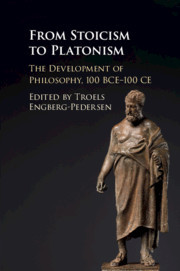Description
From Stoicism to Platonism
The Development of Philosophy, 100 BCE–100 CE
Coordinator: Engberg-Pedersen Troels
This book explores the process during 100 BCE–100 CE by which dualistic Platonism became the reigning school in philosophy.
Language: English
Subject for From Stoicism to Platonism:
From Stoicism to Platonism
Publication date: 08-2021
Support: Print on demand
Publication date: 08-2021
Support: Print on demand
From Stoicism to Platonism
Publication date: 02-2017
Support: Print on demand
Publication date: 02-2017
Support: Print on demand
Description
/li>Contents
/li>Biography
/li>
From Stoicism to Platonism describes the change in philosophy from around 100 BCE, when monistic Stoicism was the strongest dogmatic school in philosophy, to around 100 CE, when dualistic Platonism began to gain the upper hand - with huge consequences for all later Western philosophy and for Christianity. It is distinguished by querying traditional categories like 'eclecticism' and 'harmonization' as means of describing the period. Instead, it highlights different strategies of 'appropriation' of one school's doctrines by philosophers from the other school, with all philosophers being highly conscious of their own identity. The book also sets out to break down the traditional boundaries between, on the one hand, the study of Greco-Roman philosophy in the period and, on the other hand, that of contemporary Hellenistic Jewish and early Christian writings with a philosophical profile. In these ways, the book opens up an immensely fruitful period in the history of philosophy.
List of contributors; Acknowledgements; 1. Introduction: a historiographical essay Troels Engberg-Pedersen; 2. Plato, Chrysippus and Posidonius' theory of affective movements A. G. Long; 3. Cicero's Plato Malcolm Schofield; 4. Are we nearly there yet? Eudorus on Aristotle's Categories George Boys-Stones; 5. Stoicism and Platonism in Arius Didymus Myrto Hatzimichali; 6. Oikeiōsis in Stoicism, Antiochus and Arius Didymus Christopher Gill; 7. The Platonist appropriation of Stoic epistemology Mauro Bonazzi; 8. 'Becoming like God' in Platonism and Stoicism Gretchen Reydams-Schils; 9. From Stoicism to Platonism: the difficult case of Philo of Alexandria's De providentia I David T. Runia; 10. From Cicero to Philo of Alexandria: ascending and descending axes in the interpretation of Platonism and Stoicism Carlos Lévy; 11. The love of wisdom: Middle Platonism and Stoicism in the Wisdom of Solomon Gregory E. Sterling; 12. Seneca and Epictetus on body, mind and dualism A. A. Long; 13. The dilemma of Paul's physics: features Stoic-Platonist or Platonist-Stoic? Stanley Stowers; 14. The legacy of Musonius Rufus Brad Inwood; 15. Stoic and Platonic reflections on naming in early Christian circles: or what's in a name? Harold W. Attridge; 16. Is Plutarch really hostile to the Stoics? Jan Opsomer; 17. Peripatetic appropriations of oikeiōsis: Alexander, Mantissa, chapter 17 Charles Brittain; Bibliography; Index of passages; General index.
Troels Engberg-Pedersen is Emeritus Professor in the Faculty of Theology at the University of Copenhagen. He has moved freely between the disciplines of classics, ancient philosophy and Christian theology (the New Testament), and has published major monographs on Aristotle's Ethics, Stoic ethics, the Apostle Paul (and Stoicism) and, most recently, the Gospel of John (and philosophy).
© 2024 LAVOISIER S.A.S.




